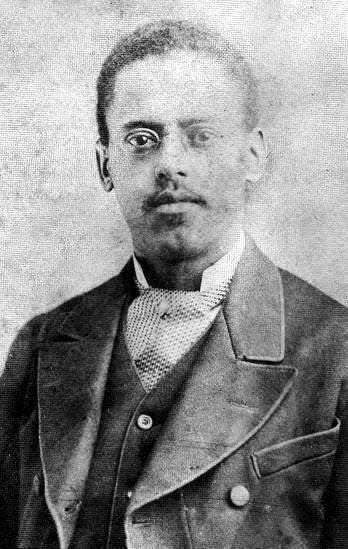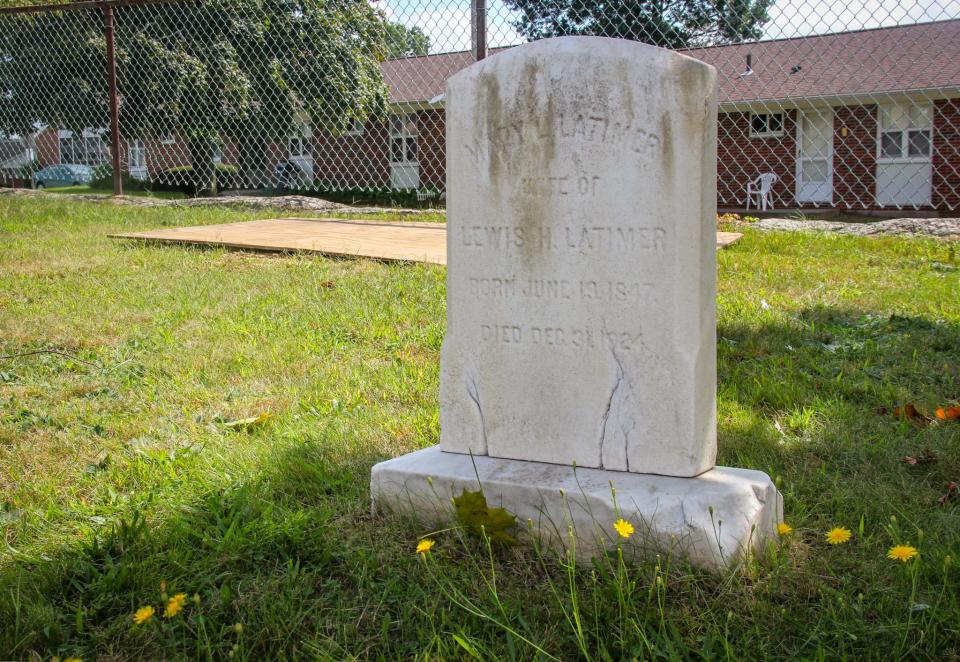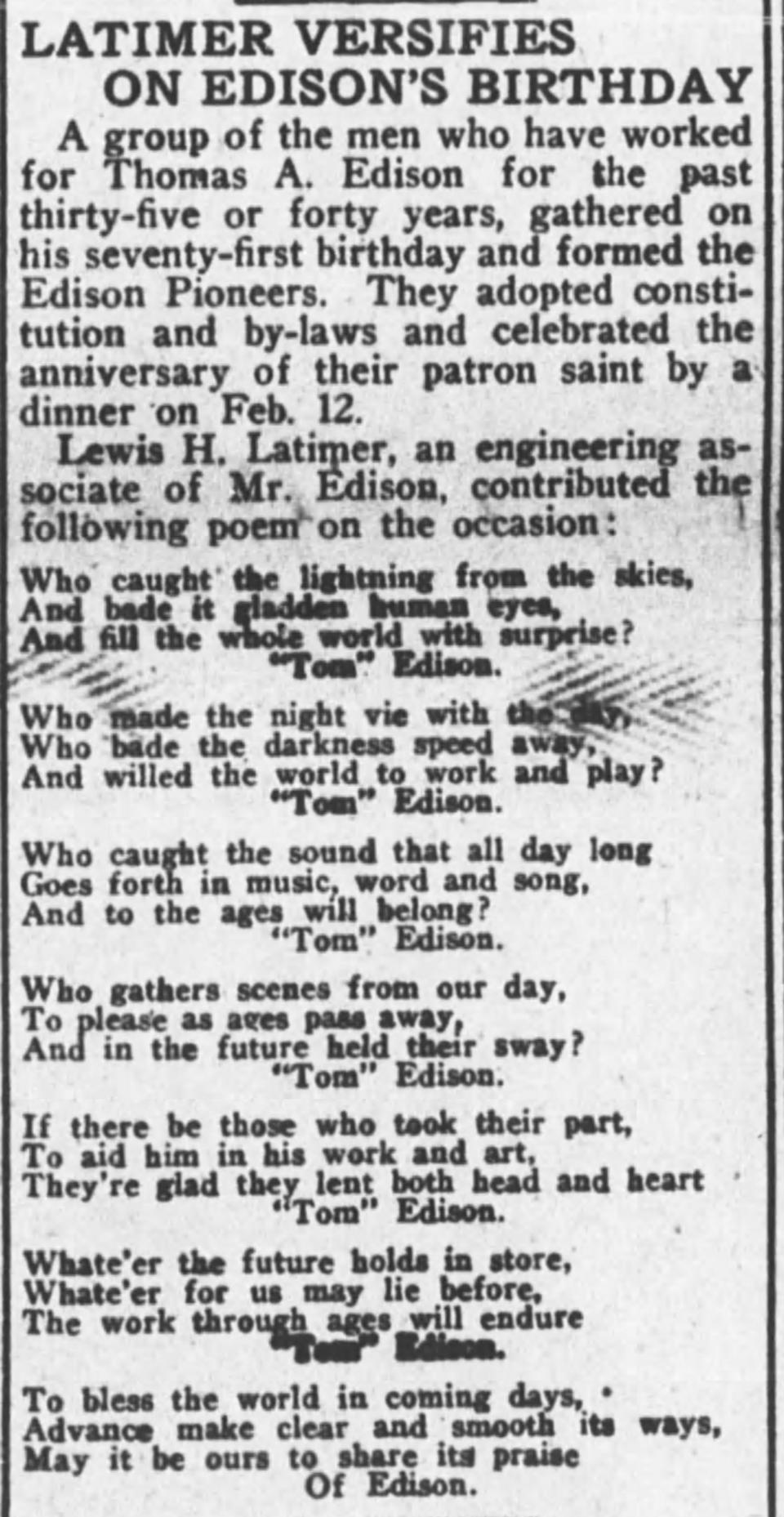'Spider-verse' Miles Morales actor will honor a Black 'superhero' buried in Fall River
- Oops!Something went wrong.Please try again later.
- Oops!Something went wrong.Please try again later.
FALL RIVER — The city will give a long-overdue honor to its own Black “superhero” later this month, when it installs a memorial to scientist Lewis H. Latimer in Oak Grove Cemetery.
Latimer, a Black innovator who in the 19th century helped Thomas Edison invent the light bulb and created several inventions including an early form of air conditioning, is buried in Fall River but has no headstone.
Frank Bonafilia and Jon Cropper, of the nationally renowned Edison Awards and its Latimer Fellowship program, spearheaded a project to correct that. A monument to Latimer will be installed at his gravesite on Saturday, Sept. 23, at 1 p.m.
“The ceremony itself is going to be very special,” said Cropper, the founder of Futurlogic Advanced Concepts, a design and branding studio, and a co-founder of the Latimer Fellowship. “There’s a lot of romanticism that has gone into trying to honor this American hidden figure with respect.”

The Edison Awards has a guest list of 65 to 70 people planned to attend the ceremony, many of them recipients of Latimer fellowships — from CEOs and artificial intelligence professors to an actual Black superhero: Shameik Moore, the entrepreneur, musician and actor who voices Miles Morales in the “Spider-Verse” animated films.
Who is Black inventor Lewis H. Latimer?
Latimer had a remarkable career in American scientific history. His parents escaped slavery in the South via the Underground Railroad to Boston; his father, George Latimer, was arrested and nearly sent back to bondage, but his case spurred outrage and inspired the flourishing of a strong abolitionist movement in Boston. A free Black minister bought George Latimer's freedom and the family settled in the area.
Born in Chelsea in 1848, Latimer fought in the Navy in the latter years of the Civil War while underage. He found work after the war as an office boy at a patent clerk’s office, where he taught himself draftsmanship. His employers recognized his skill and Latimer worked his way up to head draftsman at the firm.
Latimer’s skill saw him hired in 1876 to produce the blueprints for the first telephone by Alexander Graham Bell, helping Bell file his patent hours before a rival.
6 homes part of Black history: Fall River was an Underground Railroad junction -- learn where slaves were sheltered

Latimer was also a keen inventor, filing his own patents including different types of electric lamps, a railroad toilet, a tool to support books on shelves and even an early air conditioning device. By the 1880s, he entered the brand-new field of electric lighting, and made himself an authority on the subject, installing some of the first electric lighting systems in New York and Philadelphia. He found work with Edison, becoming patent expert at General Electric and inventing a new process for making carbon filaments for light bulbs that greatly extended their life.
Beyond science, Latimer was an accomplished musician, playing the flute and violin, painter and writer of poetry and plays — and an early figure in the movement for Black civil rights.
Latimer was connected to Fall River via his wife, Mary Lewis, whom he married in 1873 at her family home on Robeson and Bedford streets. Though they lived much of their lives in Queens, New York, she returned to Fall River at her burial in 1925 — Lewis followed her in 1928.

How the Edison Awards became involved
The Edison Awards, Cropper said, are “the Oscars of corporate innovation” — since 1987, the organization has honored industry leaders, thinkers, designers, marketers and inventors including Ted Turner, Elon Musk, Steve Jobs, Jony Ive and Martha Stewart.
Bonafilia, its executive director, said a conversation with Cropper after the death of “Black Panther” actor Chadwick Boseman in 2020 led them to create a fellowship specifically for Black innovators.
“And [Cropper] said, ‘We’ve got to find new superheroes both for the Black and brown community, and for the world at large.’ And he asked me if I’d ever heard of Lewis Latimer,” Bonafilia said.
Seeing the far future: A master plan has ideas to keep the cemetery active for centuries.
After doing some research into Latimer’s life, Bonafilia said he discovered Latimer was buried in Fall River with no headstone.
“At that moment, it became reality, that we need to do something, and we need to something that’s going to shock the world," Bonafilia said. “But we didn’t just want to put a headstone. We wanted to build a program that ultimately knocks down the barriers for some of the most brilliant Black geniuses or superheroes in the world.”

A memorial worthy of a scientific genius
Ten people are buried in the same plot as Latimer, including his wife and one of their daughters, Louise. Their gravesite sits along the south edge of the cemetery, overlooking Locust Street. Only his wife, Mary, has a headstone. City assistant planner Chris Parayno said he isn’t sure why Latimer, a nationally prominent figure, had no marker.
“I don’t think it would be uncommon to not have a headstone," Parayno said. "I know we’ve got sections of the cemetery where the monuments are kind of sparse because the death occurred during the Great Depression, and they weren’t spending money on those kinds of things.”
The Edison Awards and Latimer Fellowship have sought to correct that in high style.
“The memorial itself is really exciting," said Cropper. “We’re working with the artist who created the Martin Luther King memorial in Atlanta. ... It’s a very beautiful stone with a bronze bust of his face, and a list of all his living descendants with a couple of elegant quotes. And I think that it is a memorial worthy of the man.”
Bonafilia said a man of Latimer’s genius deserves to be remembered — not only with stone and bronze, but with his namesake fellowship and the access it provides to today’s great thinkers.
“The invention of light, the invention of the phone — we're still using these innovations today," Bonafilia said. “And Latimer was such a big part of that. What would’ve happened if there was a fellowship that removed all the barriers of entry for him back in the day? Where would he be today?”
Dan Medeiros can be reached at dmedeiros@heraldnews.com. Support local journalism by purchasing a digital or print subscription to The Herald News today.
This article originally appeared on The Herald News: Edison Awards gives Black inventor Lewis Latimer a grave memorial

